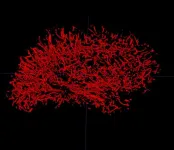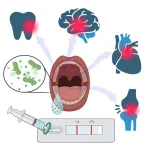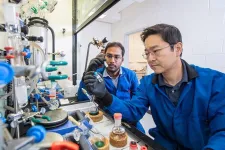(Press-News.org) Milan, Italy: Women exposed to air pollution give birth to smaller babies, according to research that will be presented at the European Respiratory Society International Congress in Milan, Italy [1]. The research also shows that women living in greener areas give birth to bigger babies and this may help counteract the effects of pollution.
There is a strong relationship between birthweight and lung health, with low birthweight children facing a higher risk of asthma and higher rates of chronic obstructive pulmonary diseases (COPD) as they grow older.
Researchers say there is a need to reduce air pollution and make towns and cities greener to help protect babies and their developing lungs from potential harm.
The study was based on data from the Respiratory Health in Northern Europe (RHINE) study and presented by Mr Robin Mzati Sinsamala, a researcher in the Department of Global Public Health and Primary Care at the University of Bergen (UiB), Norway. It included 4286 children and their mothers living in five European countries (Denmark, Norway, Sweden, Iceland and Estonia).
The researchers gauged the greenness of the areas where the women were living during pregnancy by measuring the density of vegetation on satellite images. This vegetation includes forests and farmland as well as parks in urban areas. The researchers also used data on five pollutants: nitrogen dioxide (NO2), ozone, black carbon (BC), and two types of particulate matter (PM2.5 and PM10). The average levels of air pollution were within European Union standards. Researchers compared this information with the babies’ birthweights, taking account of factors that are known to affect birthweight, such as mother’s age, whether the mothers smoked or had any other health conditions.
They found that higher levels air pollution were linked with lower birthweights, with PM2.5, PM10, NO2 and BC associated with average reductions in birth weight of 56g, 46g, 48g and 48g, respectively. When researchers took greenness into account, the effect of air pollution on birthweight was reduced. Women who lived in greener areas had babies with slightly higher birth weight (27g heavier on average) than mothers living in less green areas.
Mr Sinsamala said: “The time when babies are growing in the womb is critical for lung development. We know that babies with lower birthweight are susceptible to chest infections, and this can lead on to problems like asthma and COPD later on.
“Our results suggest that pregnant women exposed to air pollution, even at relatively low levels, give birth to smaller babies. They also suggest that living in a greener area could help counteract this effect. It could be that green areas tend to have lower traffic or that plants help to clear the air of pollution, or green areas may mean it’s easier for pregnant women to be physically active.”
The study is part of a wider programme of research called Life-GAP (Lifespan and inter-generational respiratory effects of exposures to greenness and air pollution) that is investigating the effects of air pollution and greenness on lung health in generations of Europeans over the long term.
European Respiratory Society Advocacy Council Chair, Professor Arzu Yorgancioğlu, who was not involved in the research, says: “This study adds to a growing body of evidence on the damage that air pollution is having on our health, especially in vulnerable babies and young children. Women who are pregnant will want to protect their babies from potential harm. However, as individuals, it can be difficult to reduce our exposure to air pollution or make our neighbourhoods greener.
“As doctors and researchers who care about children’s health, we need to put pressure on governments and policy-makers to lower the levels of pollution in the air we breathe. This study also suggests that we could help to mitigate some of the effects of pollution by making our neighbourhoods greener.”
END
Mums exposed to air pollution give birth to smaller babies, but living in a greener area may mitigate the risks
2023-09-08
ELSE PRESS RELEASES FROM THIS DATE:
Stevens INI receives new funding to study small vessel disease in Asian Americans
2023-09-07
Asian Americans are among the fastest growing populations in the U.S. but are significantly underrepresented in Alzheimer’s disease and related dementias (ADRD) research. This means there is a significant knowledge gap of ADRD in this particular group at a time when the global Asian population is rapidly aging and the burden of ADRD will likely mirror this growth. Thanks to a new award, the Keck School of Medicine of USC’s Mark and Mary Stevens Neuroimaging and Informatics Institute (Stevens INI) is perfectly poised to help bridge the gap.
Professor of ...
What’s love got to do with it? An exception to the recognition of musical themes
2023-09-07
New Haven, Conn. — Music can take on many forms in cultures across the globe, but Yale researchers have found in a new study that some themes are universally recognizable by people everywhere with one notable exception — love songs.
“All around the world, people sing in similar ways,” said senior author Samuel Mehr, who splits his time between the Yale Child Study Center, where he is an assistant professor adjunct, and the University of Auckland, where he is senior lecturer in psychology. “Music is deeply rooted in human social interaction.”
For ...
Neurodivergent engineering research at USU funded by the National Science Foundation
2023-09-07
More will soon be known about neurodiversity in engineering students, thanks to funding from the National Science Foundation and the efforts of Utah State University College of Engineering Assistant Professor Marissa Tsugawa.
Tsugawa, along with collaborators from USU and Minnesota State University, received $373,508 in funding for their research in identifying emancipatory language and capturing neurodivergent narratives.
“The term neurodivergent refers to a person with a brain that functions significantly different from the societal norm, such as someone with ADHD or autism,” Tsugawa said. “The term is used to celebrate, ...
Study seeks to explain widespread inequality for developing diabetes mellitus following gestational diabetes
2023-09-07
September 5, 2023-- Racial and ethnic inequities in diabetes have been established following gestational diabetes, but these inequities are substantial and have been an overlooked facet of maternal health equity, according to a new study by epidemiologist Teresa Janevic, PhD, associate professor of Epidemiology at Columbia University Mailman School of Public Health. Until now there was limited research on racial and ethnic disparities in type 2 diabetes after gestational diabetes mellitus (GDM). The findings are published online in the journal Obstetrics & Gynecology.
“Very few studies ...
New at-home test for gingivitis protects oral health
2023-09-07
Engineers at the University of Cincinnati have developed a new device that can warn consumers about early risks of tooth decay from diseases such as gingivitis and periodontitis.
Gingivitis, the earliest form of gum disease, is caused by bacteria. But not just any bacteria.
The problem for researchers was getting a device to single out the particular type responsible for the disease, said Andrew Steckl, an Ohio Eminent Scholar and distinguished research professor in UC’s College of Engineering and Applied Science.
“It’s been quite the challenge to get to the point where we can detect this toxin created by the bacteria ...
Internationally recognized computational researcher Spyridon Bakas, PhD, to serve as inaugural director of Division of Computational Pathology
2023-09-07
INDIANAPOLIS—Indiana University School of Medicine Department of Pathology is launching a new Division of Computational Pathology and a Research Center for Federated Learning in Precision Medicine. Both will be led by Spyridon Bakas, PhD, an internationally recognized computational researcher who brings ten years of experience and NIH grant funding to this growing field that combines artificial intelligence and medicine.
“Computational pathology is a growing area of medicine around the world,” Bakas said. “The idea is to leverage information that exists within tissue slides ...
Two in one: FSU researchers develop polymer that can be adapted to high and low temperature extremes
2023-09-07
The modern world is filled with synthetic polymers, long-chained molecules designed by scientists to fill all manner of applications.
Researchers at FAMU-FSU College of Engineering have developed two closely related polymers that respond differently to high and low temperature thresholds, despite their similar design. The polymer pair could be used in applications in medicine, protein synthesis, protective coatings and other fields. Their work is published in Macromolecules.
“Typically, in order to have one thermal behavior, we have to prepare a polymer for that specific application, and if you ...
New stroke treatment in development at UTHSC
2023-09-07
A study at the University of Tennessee Health Science Center aims to develop a new way to treat ischemic stroke, a leading cause of death in adults worldwide.
The study is funded by a $1,155,000 translational grant from the National Institute of Neurological Disorders and Stroke, part of the National Institutes of Health. Jianxiong Jiang, PhD, associate professor in the Department of Pharmaceutical Sciences and the Department of Anatomy and Neurobiology, and Jiawang Liu, PhD, director of the Medicinal Chemistry ...
New study reveals the power of railroads to buffer coal plants from a carbon emissions tax
2023-09-07
A new study by University of Maryland Economist Louis Preonas provides empirical evidence that railroads are likely to cut transportation prices to prop up coal-fired plants if U.S. climate policies further disadvantage coal in favor of less carbon-intensive energy sources.
One strategy being considered to help reduce the country’s contribution to global climate change is a tax or fee on greenhouse gas emissions by coal-burning power plants. The hope is that such fees will reduce competitiveness of coal-fired energy and consumers will chose lower-emission options at a competitive cost. The new study, published September 7, 2023, in The ...
Mount Sinai scientists unlock secrets of red blood cell transporter, potentially paving the way for new drugs
2023-09-07
New York, NY (September 7, 2023)—Researchers at the Icahn School of Medicine at Mount Sinai have identified the structure of a special transporter found in red blood cells and how it interacts with drugs. Details on the findings, which were reported in the September 7 issue of Nature Structural & Molecular Biology [DOI: 10.1038/s41594-023-01085-6], could lead to the development of more targeted medicines.
The research team, led by Daniel Wacker, PhD, Bin Zhang, PhD, and Avner Schlessinger, PhD, found that this transporter facilitates ...









